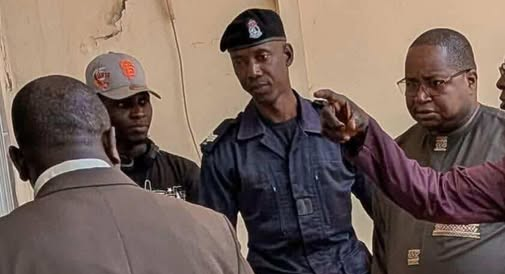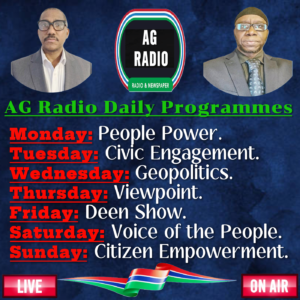Government Spokesperson Ebrima G. Sankareh made an appearance before the High Court on Monday to explain comments he made in a recent radio broadcast, a crucial point in the current police shooting trial. He vehemently denied that his remarks represented personal thoughts.
As the government’s spokesperson and head of diaspora relations since 2018, Sankareh informed the court that all of his remarks were based only on information from law enforcement. He made it clear that he always used the word “alleged” to qualify his claims about the accused’s involvement.
A.M. Yusuf, the Director of Public Prosecutions, publicly retracted an earlier attempt to stay proceedings and an appeal at the Court of Appeal to start the proceedings, which were presided over by Justice Ebrima Jaiteh. The court rejected the motion since the defense did not object to the withdrawal.
Sankareh was extensively questioned over the contents of his appearance on West Coast Radio’s Coffee Time with Peter Gomez during cross-examination by defense attorney Lamin J. Darboe, who was defending the first accused, Ousainou Bojang. Sankareh argued that his statements were based on preliminary police reports or that his words had been misconstrued when questioned about particular claims, including information concerning a co-conspirator, the recovery of monies, and the accused’s attendance at a related trial.
Sankareh denied making any personal attributions about the accused’s purported connections to the Cassamance rebel organization in his testimony, saying, “I did not independently verify nor personally witness any of the events I discussed.” He stated that soon after the incident, he left for the United Nations General Assembly in New York and ceased commenting on the subject.
Sankareh’s assertion that he only spoke with the police once about the matter and that all of his information came from them was confirmed by additional interrogation by Counsel Adama Sillah, who was representing the second accused. Sankareh, a professional journalist, stated that he verified the information but refrained from speculating on whether the inquiry was impacted by the president’s public promise to provide the police one million dalasis.
Counsel Sillah asked the court to order West Coast Radio to provide the complete, unedited audio recording of the September 14 interview because he was concerned about the veracity and completeness of Sankareh’s testimony. The station’s owner was ordered to appear with the original tape after Justice Jaiteh granted the request without any objections from either party.
Citing pertinent provisions of the Evidence Act of 1994 and the Criminal Procedure Code, the judge emphasized the order’s significance in the pursuit of justice.
The court will examine adherence to the order and resume proceedings on June 24, 2025, at 2:15 p.m., when the trial has been postponed.
The verbatim discussions between the government spokesperson and the defense attorneys are reproduced below.
“Do you recall your interview with West Coast?” Lamin J. Darboe, the counsel, inquired.
Ebrima G. Sankareh said, “Yes.”
Counsel Lamin J. Darboe went on, “You stated in the interview that the first accused is accountable for the Sukuta-Jabang shooting.”
“I didn’t say that. In response, Ebrima G. Sankareh responded, “I said allegedly.”
Counsel Lamin J. Darboe asked, “You stated that the shooter has been arrested and is in custody.”
Ebrima G. Sankareh said, “I stated that the accused shooter was taken into custody and arrested.”
Counsel Lamin J. Darboe added, “You also mentioned that he has a co-conspirator.”
The response from Ebrima G. Sankareh was, “I said alleged co-conspirator.”
Counsel Lamin J. Darboe pressed, “You mentioned that he attended Yankuba Darboe’s trial.”
Ebrima G. Sankareh denied saying that.
“Recall that you claimed the suspected shooter was spotted in a mosque with his accomplice following the shooting?” Lamin J. Darboe, the counsel, inquired.
Ebrima G. Sankareh answered, “No, I never said that, but something similar.”
“Remember informing Peter Gomez that the suspected shooter intended to murder six officers?” Lamin J. Darboe, the counsel, asked.
Ebrima G. Sankareh clarified, “Based on the information I obtained from the investigators.”
“Do you recall informing Peter Gomez that the accused shooter had been found to have money?” Lamin J. Darboe, the counsel, inquired.
Ebrima G. Sankareh explained, “No, I said the police said they have recovered money from the alleged shooter.”
“Have you verified the sum?” Lamin J. Darboe, the counsel, followed up.
Ebrima G. Sankareh said, “No, I didn’t verify the amount; I followed the police’s instructions.”
“What did you and his co-conspirator tell Peter Gomez about the mosque?” Lamin J. Darboe, the counsel, asked.
Ebrima G. Sankareh clarified, “I said he was seen with his co-conspirator in a mosque.”
“Did you mention that his co-conspirator stole the alleged shooting from the mosque and smuggled it into Cassamace?” Lamin J. Darboe, the counsel, inquired.
Ebrima G. Sankareh affirmed, “Yes, I said that based on the information from the police.”
An image of a hoodie is displayed. Counsel Lamin J. Darboe remarked, “You mentioned that the accused shooter was present at the trial and was dressed in a hoodie jumper.”
Ebrima G. Sankareh explained, “Yes, as a security, not as a demonstrator, just like I’m here with my security in court, as a witness.”
“Have you mentioned that the president promised a million dalasis?” Lamin J. Darboe, the counsel, asked.
Ebrima G. Sankareh acknowledged, “Yes, the president’s pledge to donate one million dalasis was widely reported in the media.”
“What about the victims’ families, who make up around 100,000 Dalis?” inquired Counsel Lamin J. Darboe.
Ebrima G. Sankareh clarified, “No, I stated that the police had promised the family 25,000 dalasis.”
“Are you in agreement that the claims you made to the public were untrue?” Lamin J. Darboe, the counsel, urged.
Ebrima G. Sankareh replied, “As a preliminary investigation, they were accurate at the time, and I then excused myself from the whole issue and never said anything about it again.”
“Were you removed from the case, or did you remove yourself from the case?” Lamin J. Darboe, the counsel, asked.
“Neither was I withdrawn, nor was I withdrawn. A few days after the incident, I went to America for the UN general assembly and then resumed my vacation before coming back. According to Ebrima G. Sankareh, the case has escalated too much.
“Did you know that the police held a press conference and claimed that everything you said was theirs?” Lamin J. Darboe, the counsel, inquired.
Ebrima G. Sankareh confirmed, “Everything I said was from the police.”
Counsel Lamin J. Darboe told the court that he had finished questioning the witness at this point. Adama Sillah, the second defense attorney, was then asked by the court to continue with cross-examination.
Counsel Sillah then went on to interrogate Ebrima G. Sankareh on behalf of the second accused.
“How many people did you interview about this case?” Adama Sillah, the counsel, inquired.
Ebrima G. Sankareh replied, “One.”
“Did you maintain your position throughout that interview?” Adama Sillah, the counsel, asked.
Ebrima G. Sankareh confirmed, “Yes, based on the information and evidence I was given.”
“Who provided the information to you?” Adama Sillah, the counsel, inquired.
Ebrima G. Sankareh responded, “From the police, as I spoke to everyone in the police.”
Counsel Adama Sillah pressed, “So, you spoke to all the police?”
Ebrima G. Sankareh said, “I get the information from the police department.”
“From whom specifically did you obtain the information?” Adama Sillah, the counsel, pushed.
Ebrima G. Sankareh said, “From the police.”
“Did the police intelligence unit or the IGP provide you with the information?” Adama Sillah, the counsel, inquired.
Ebrima G. Sankareh clarified, “I received the information from the police department because IGP wasn’t in the country at the time.”
“Did you first verify the information as the government spokesperson?” Adama Sillah, the counsel, asked.
Ebrima G. Sankareh confirmed, “Yes, as a trained journalist, I verified all the information given to me first.”
“Are you prepared to inform the police that the information they gave you was incorrect?” Adama Sillah, the counsel, inquired.
Ebrima G. Sankareh responded, “No, I didn’t, but the police held a press conference and confirmed that everything I said came from them, as primarily the investigation.”
“Don’t you believe that the investigation would have been skewed by the President’s one million pledge?” Adama Sillah, the counsel, asked.
Ebrima G. Sankareh said, “No.”
Did you recall mentioning in your interview that Ousainou Bojang is a member of the Cassamace rebel group? Adama Sillah, the counsel, inquired.
Ebrima G. Sankareh answered, “I can’t remember.”
“Did you or didn’t you?” asked Counsel Adama Sillah.
Ebrima G. Sankareh answered, “I can’t remember.”
This is when Counsel A. Sillah asked the court to mandate that West Coast Radio provide the interview.
Counsel A. Sillah said, “My lord, I ask the court to order West Coast Radio to provide the audio of the interview with Ebrima G. Sankareh.”
After voicing concerns that some of his questions had not received enough attention, Counsel Sillah submitted the application and asked for the interview tape so he could continue his cross-examination.
Since neither the defence counsel objected, the request was granted by Presiding Judge Justice Jaiteh.


